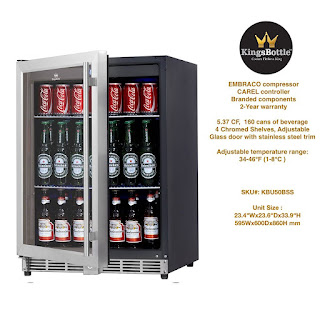How to Choose Dry Ager Meat Maturing: Everything You Need To Know
The dry-aging process is quite expensive, both in the equipment required and in the investment cost of the meat. It's not something you can do (properly) with a plastic bag or box, and you have to be prepared to cut out a good chunk of the final product that you worked so hard to create. Now if you're still on board after reading all of that, here's what you need to know:
It is a post mortem treatment for beef designed primarily to enhance flavor, with the secondary benefit of promoting tenderness. Flavor development is determined by a reduction in moisture that correlates with a concentration of flavor and the cultivation of "good" mold and bacteria to give the meat a funky, nutty profile. In short, dry-aging makes the meat taste really good.
What kind of steak can be dried at home?
This is very important. You must not age individually cut steaks. Technically speaking, you can age individually cut steaks, but it's a colossal waste and silly to do so. Your meat will shrink tremendously in size as it loses water through the aging process. When you combine the amount of skin cutting that needs to occur along with the smallest size, you will barely have a sliver of steak left.
What must be dry aging is whole sub-primary or larger muscles. For example, a strip of tenderloin (bone-in), or a rib 107/109 (basically a giant slab of ribeye on the bone). It doesn't matter if it's grains or grass-fed animals, it's just a matter of personal preference. You want to look for meat that is on the bone, not because it tastes better, but because you can cut through the bone during cutting and not lose any meat. If you read on, I'll explain why you cut the bone instead of cooking the meat with the bone.
The quality of the meat also matters. You should use meat with a minimum degree of marbling, Choice grade or higher, and stay away from cuts that are too lean (such as round). Lean or lower grade meat does not develop significant flavor enhancement because the marbling is slight. Fat equals flavor, so the absence of fat means you are missing the flavor foundation you need to build on.
Feel free to experiment a bit with other cuts, like beef short rib, as long as you remember that you will need to trim off any skins. For example, dry-aging may not be suitable for a breast, where the floor may already be too thin to cut and sacrifice further. In their own experiments, CAB also noted that dry-aged brisket did not absorb any smoke flavor, and thus determined that dry-aged barbecue ribs were useless exercise.
Maybe it's a no-brainer, but since this is an attempt at a complete guide: all dry-aging should occur with unwrapped meat, where the cuts are placed "naked" in the refrigerator. If you leave the meat in any vacuum bag it is called wet aging.
How long should the meat age?
This is where the art of dry-aging becomes a den. Let's chat for a moment about cuteness. Yes, dry-aging can help tenderness, but it is done primarily to intensify the flavor. After about 28 days of aging, the meat is as tender as it will become. Technically speaking, for you fans, it has the ability to continue to soften up, but it's practically insignificant beyond this point. What you're seeing now is the intensity of the flavor and the nutty notes of the mold and the controlled decomposition (yes, not the most pleasant way to put it, but that's literally dry aging!).
Short answer: how long you allow the meat to age depends on many factors. What cut are you wearing? What kind of mold do you have in your fridge? Is it more intense than other strains? How much of that mold is there? And most importantly: what is your personal preference?
It usually takes at least 30 days before you can begin to taste the characteristic dry-aging flavors. My personal preference is between 60 and 80 days. That may change as I get to know my own settings better (in terms of flavor intensity). After a certain point, dry-aged steak goes a delicacy. That is, the more fun it becomes, the fewer people it will attract. Sort of like a light blue cheese versus gorgonzola. One is much more humid than the other, and some palates find it too overwhelming.
You must also consider the loss versus the gain. The longer you let the meat mature, the thicker and tougher the skin will be, ergo, the more you will have to cut. There comes a point where the benefit of flavor enhancement is negated by the sheer loss of product and shrinkage.
The message here is: don't be a hero. You're not okay because you left a tenderloin in your fridge for 365 days so you can brag to your Facebook friends that you're eating a year-old steak. Slow down your roll. Try less before trying more.
The Final Note:
One of the best steak dry ager fridges has an intuitive design, the Kingsbottle. The stainless steel optic is an eye-catcher in any butcher or steakhouse. Through the door, customers can marvel at the product right into the ripening process and look forward to a juicy, dry-aged steak. So what are you waiting for! Buy Steak Dry Ager Fridge for Sale, and enjoy the relishing taste of steak.




Comments
Post a Comment